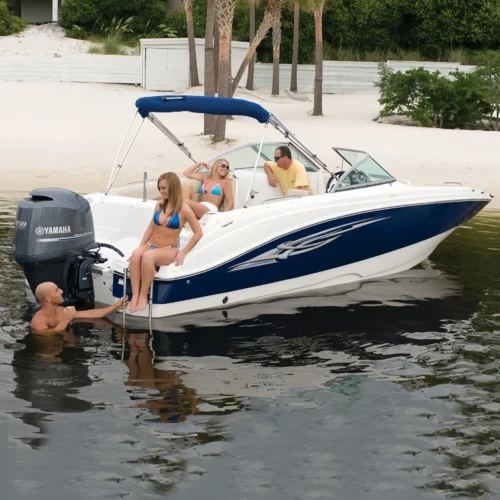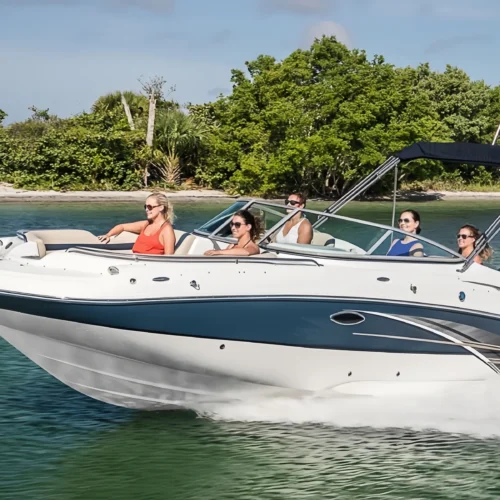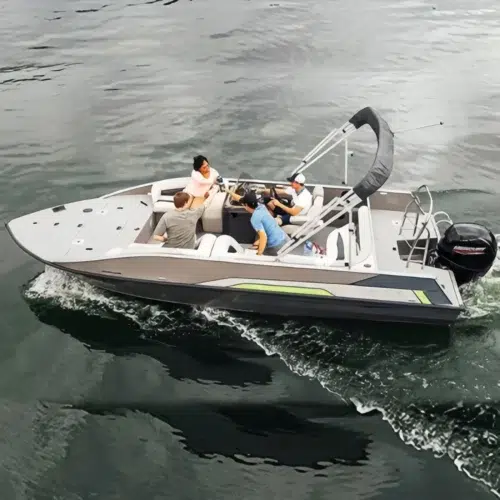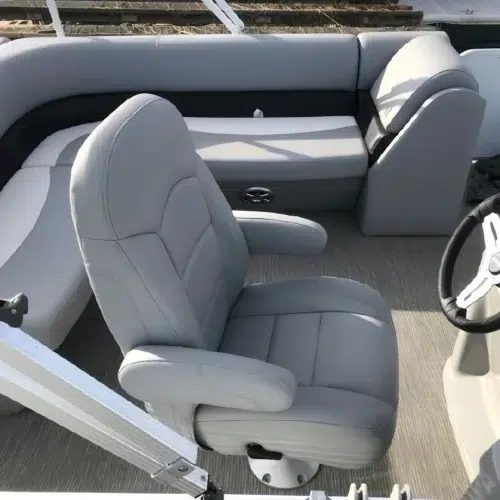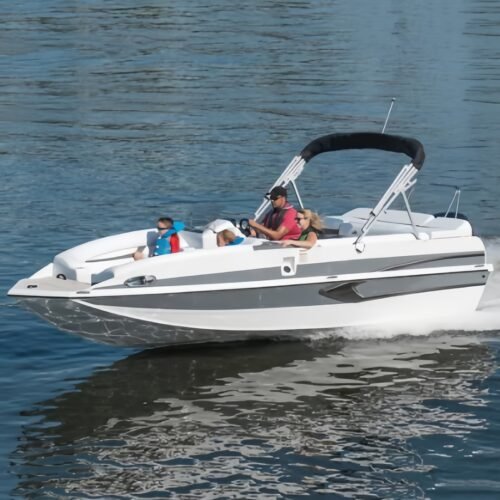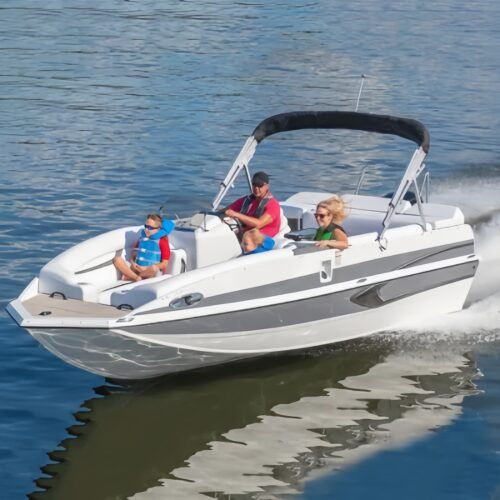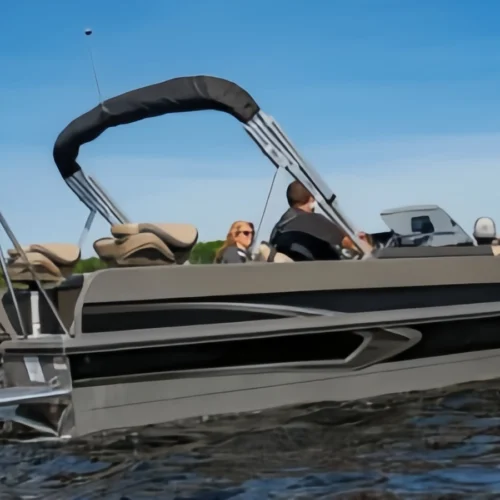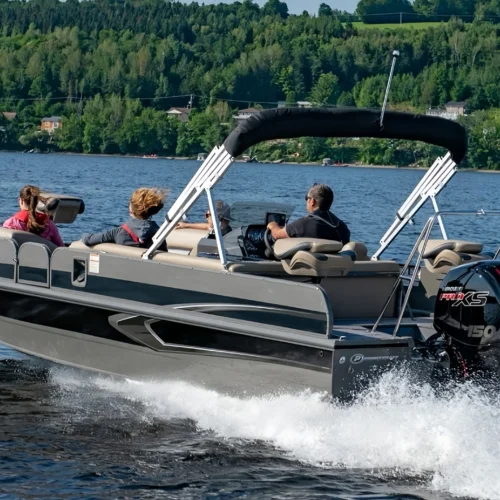Deck Boat FAQs
1. What is a deck boat?
A deck boat is a type of recreational watercraft that shares similarities with pontoon boats but has distinct differences.
Unlike pontoon boats with completely flat designs, deck boats have a V-shaped hull and a spacious deck that allows for increased speed in water sports activities.
The V-shaped hull design enables the deck boat to cut through the water to some extent. Even in moderate wind and waves, the boat can maintain stability while moving forward.
The large, open deck is also a prominent feature of a deck boat. It provides ample space for seating and lounging, offering passengers more opportunities for water recreation, cruising, fishing, and water sports.
This design allows deck boats to achieve a balance between speed, comfort, and capacity.
2. What is a deck boat used for?
For water sports enthusiasts who enjoy recreational activities on the water, a deck boat is often an ideal choice.
With its open deck layout, a deck boat can accommodate various water sports equipment such as fishing gear, live wells, and water skis.
The powerful outboard motor combined with the V-shaped hull gives the deck boat added stability, making it convenient for towing water skiers, wakeboarders, or tubes for a fun-filled experience.
Of course, deck boats are also highly suitable for those looking to party, sightsee, or cruise. Comfortable sofa seating and tables are perfect for gatherings, and the open design provides excellent visibility for sightseeing.
3. How much are deck boats?
Most people have the impression that deck boats are not cheap. While they share some similarities with pontoon boats, the larger outboard motors in deck boats contribute to higher prices.
Typically, buying a new deck boat requires a budget ranging from $25,000 to $65,000. Even small used deck boats can cost between $10,000 and $15,000.
However, luxury deck boats with more features and higher performance can retail for over $100,000, which is quite normal.
Fortunately, at NeoBoats, we negotiate deals for boat enthusiasts that are significantly lower than the market, with savings of up to 40%. If you're interested, please remember to contact us.
4. How much does a deck boat weigh?
Obviously, the weight of all boats varies based on factors such as size, boat deck material, and functionalities, and deck boats are no exception.
For smaller deck boats ranging from 18 to 20 feet, weights between 1,800 and 3,000 pounds are common.
Larger deck boats, such as those measuring 24 to 27 feet, can weigh between 3,200 and 5,500 pounds due to additional equipment and features.
However, these weights typically refer to the dry weight of the boat, excluding the motor, fuel, or passengers.
Overall, deck boats are not overly heavy, but they are certainly not lightweight. Therefore, it is necessary to prepare a dedicated trailer for your deck boat.
5. What are the disadvantages of a deck boat?
Although a deck boat is considered a versatile recreational vessel that combines speed, performance, and comfort, it still has some drawbacks.
Firstly, the initial cost and operating expenses of a deck boat are higher compared to other similar-sized boats.
Whether it's a high-quality aluminum deck boat or a more upscale fiberglass deck boat, they are not cheap. They also tend to consume more fuel than other boats, resulting in higher operational costs.
Additionally, due to the wider beam design of deck boats, they may not maneuver as well in narrow waterways compared to smaller boats.
Therefore, for those who enjoy surfing in shallow water ponds or streams, a deck boat may not be the most suitable option.
6. Are deck boats good for fishing?
Yes, although deck boats are more geared towards sports, many fishing deck boats come equipped with fishing features. The spacious and open deck provides ample space to store fishing gear and perform fishing activities.
With comfortable seating and other amenities, fishing on a deck boat can be quite enjoyable.
However, compared to specialized bass boats, deck boats may not be as agile and may not be able to position the boat quietly and precisely in areas with dense fish populations.
7. How fast do deck boats go?
Compared to pontoon boats that prioritize comfort, deck boats are known for their performance, including speed.
Of course, the speed of deck boats equipped with different-sized motors and hull designs can vary significantly.
However, common deck boats can generally reach speeds of 30-60 miles per hour. Those with exceptional performance, such as fast deck boats, can achieve speeds of 70 miles per hour or more with the help of larger motors.
8. Are deck boats good for water skiing?
As multi-purpose watercraft, deck boats have some capability for water skiing, although their performance may not be as ideal as specialized ski boats.
Due to their powerful motors, deck boats can easily reach the speed range required for water skiing.
However, the wakes generated at the stern may not be as conducive to skiing as those from specialized ski boats. This is a common issue shared by all non-specialized ski boats.
Overall, deck boats offer decent performance for recreational water skiing activities.
9. Are deck boats stable?
Similar to pontoon boats, deck boats are known for their impressive stability and spaciousness.
With their wide beams, deck boats have more buoyancy, which helps them remain stable and resistant to rocking or tipping.
The V-shaped hull design also gives deck boats better ability to cut through wind and waves. Therefore, driving a deck boat in relatively calm waters is very stable and safe.
However, as with any boat, the weight capacity should be kept within its limits to ensure safety. Otherwise, accidents are inevitable.
10. Are deck boats safe?
The majority of boats allowed to operate in public waters are considered safe. Deck boats, with their spacious hulls and stable designs, typically offer a good balance in calm water conditions.
However, if you have concerns about boat safety, there are a few points to consider.
First and foremost, improving your boating skills is essential. Familiarize yourself with operating the boat and adhere to maritime rules, as this is generally the key to safety.
Secondly, pay attention to the conditions in which the boat is used. Like other freshwater vessels, deck boats are suitable for operation in calm lakes, rivers, and protected bays.
Therefore, it is best to drive the boat on clear, windless days and avoid venturing into rough waters as a basic safety measure.
Additionally, it is necessary to have safety equipment such as life jackets, flares, and a first aid kit prepared for each passenger on your deck boat.
Lastly, experienced boat operators often slow down in crowded or shallow waters to prevent accidents.
By paying attention to these points, a deck boat can provide you with a safe, comfortable, and enjoyable boating experience.
11. Are deck boats good for the ocean?
Although deck boats are generally considered safe and can be used in the ocean to some extent, their use is limited to coastal areas.
Unlike completely flat-bottomed boats, deck boats typically feature a V-shaped hull design, which gives them some ability to cut through the water.
The presence of more powerful motors is also another advantage for deck boats venturing near the coastline.
However, like most shallow-draft boats, deck boats are not suitable for handling heavy waves.
They struggle to maintain stability in rough waters. Additionally, deck boats have limited capacity and are not designed for extended offshore travel.
Therefore, calm freshwater areas or coastal regions are the best fit for deck boats.
12. Are deck boats good in rough water?
Typically, as family boats, deck boats are not well-suited for navigating rough waters. While some deck boats may have a V-shaped hull design, they are only capable of handling moderate waves. The relatively flat hull may not withstand rough conditions.
If you expect your deck boat to handle rough waters more effectively, you can opt for a larger deck boat. Larger deck boats, equipped with more weight and bigger motors, can better handle waves.
However, it's important to note that all recreational boats on rough waters are considered an adventure, and choosing to navigate a deck boat in calm waters is safer.
13. How shallow can a deck boat go?
While deck boats are designed for recreational use in calm waters, they are not particularly suitable for very rough or shallow areas. Typically, deck boats have a draft ranging from 1 to 2 feet.
Therefore, it is generally safe to operate a deck boat in water depths of at least 3 feet. Very shallow conditions may present obstacles that can damage the hull and motor.
14. Which is better deck boat or pontoon?
In reality, when it comes to the internal equipment and layout of the boats, deck boats and pontoons are quite similar to some extent.
Both boat types are designed for stability and comfort, often equipped with soft and comfortable seating and lounging areas.
However, they have distinct differences in their exterior design. Deck boats tend to have a more streamlined hull to reduce wind resistance and water friction, thereby increasing their speed.
Additionally, the V-shaped hull enhances the maneuverability of deck boats, especially in deeper water. As a result, deck boats are suitable for a wide range of water activities, including cruising, fishing, and water sports such as water skiing and tubing.
On the other hand, pontoons typically have a flat and symmetrical hull design, which provides them with greater stability.
Combined with comfortable seating, pontoons are a popular choice for leisurely cruising, hosting water parties, and sunbathing. The more spacious design of pontoons allows for greater passenger capacity compared to deck boats of the same size.
However, pontoons tend to have slower speeds, which can be a test for more impatient boat operators. Conversely, they are favored by beginners because of their stability and slower speeds, which make them easier to control.
Overall, it is not possible to determine which boat type is definitively better as it depends on individual preferences and needs.
For those seeking more water sports-oriented activities in a smaller boat, a deck boat would provide a more thrilling experience. On the other hand, for larger groups who prefer relaxed boat parties and sunbathing, pontoons are a better fit.

